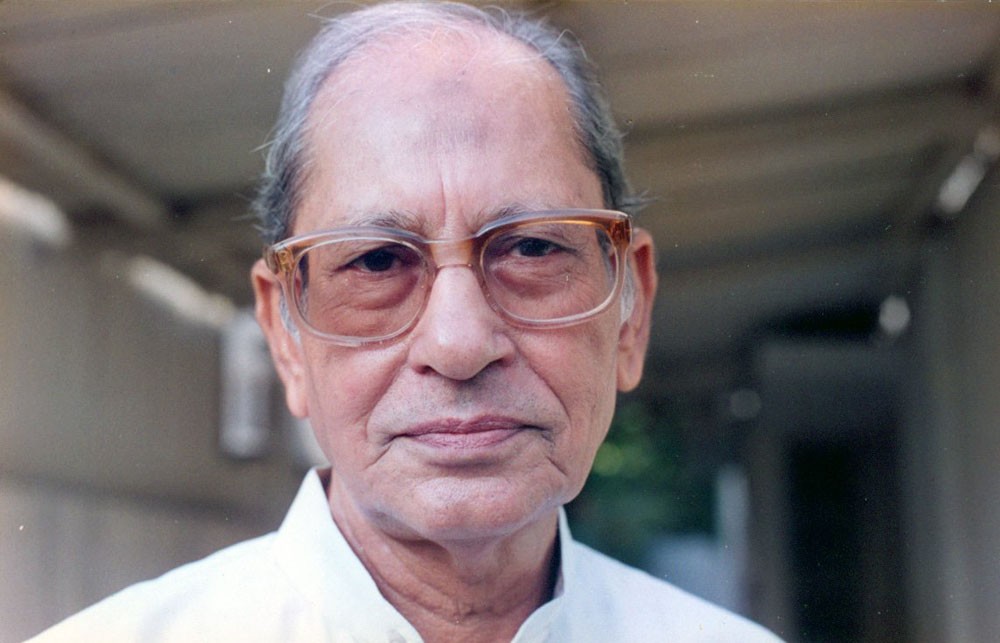

One of our distinguished nonagenarian passed away recently. Aslam Farrukhi, born in 1924, was a man of many parts. He wrote good prose, neat and precise. Very few writers in Urdu now excel him. He was also a poet, a broadcaster, a research scholar and an educationist. In short, a life fully devoted to literary and cultural pursuits. His research work on Muhammad Husain Azad, which earned him a doctorate, is important. There was an element of mysticism in his disposition, probably something inherited, and he felt rightfully proud of the book he wrote about Hazrat Nizamuddin Auliya, Ameer Khusro and Hasan Sijzi. He thought that the book entitled Dabistan-e-Nizam was the most rewarding achievement of his life.
There can hardly be any doubt about the sincerity of his feelings. It was a subject very dear to his heart and seemed quite uplifting and far removed from the secular or banausic concerns of life’s daily grind. To read Dabistan-e-Nizam is to feel the intensity which underscores the book from beginning to end and also to notice that the entire work is a humble tribute to great and unforgettable individuals.
Nevertheless I think, although I may well be wrong, that Aslam Farrukhi’s reminiscences of notable persons or merely common men he met during the course of his life, written down as long and short sketches, will have plenty of staying power. The reason, to my mind, is simple enough. Mystics like Hazrat Nizamuddin Auliya or poets like Ameer Khusro or men of letters of the stature of Muhammad Husain Azad will never lack admirers. They will be talked about, venerated or praised over and over again. But there are lesser persons, men of letters or else, who are likely to be overlooked - in fact may have been forgotten already - and will now live on because Aslam Farrukhi wrote about them so lovingly and in so convincing a manner.
Some of these sketches, which deal with simple, ordinary men and women, stand out, who had no pretentions and hardly any ambition, led a hand-to-mouth existence, maybe not at peace with the world at large but not at loggerheads with it either, except that little bits of quarrels and scraps lent some piquancy to their humdrum lives. He could have written some first rate fiction had he tried his hand at it. We can still read some of his sketches as exercises in mimetic or discursive fiction.
Did he underrate his sketches? We don’t know for sure. However, the fact remains that he did have a penchant for penning them. He could have very easily not written any. There was no compulsion. So many writers, some of them excellent, never bothered to take notice of the people they met or lived with. When he says that Dabistan-e-Nizam is his best work and by stating this relegates the sketches to a lesser status, can we see it as a misjudgement? Writers often assume that a work at which they have worked the hardest is their best and what they merely wrote as a diversion, pleasant or frivolous or whatever, mere spinoffs of a prolific mind, is of little importance. It is a common error. The most glaring example we have in this regard is Cervantes. He considered himself a remarkable poet and playwright. Much to his chagrin, his novel Don Quixote, which he had tossed off without much thought, became immensely popular. In his opinion readers who could not appreciate the grandeur of his plays and poems but found his novel a captivating read were an empty-headed lot.
Anyway, back to the sketches. I don’t remember exactly how many there are. Probably sixty or thereabouts. A fair selection would help enhance his reputation. The sketches can easily be split into four categories. Firstly of those persons who are already well known, like Dr Ghulam Mustafa Khan, Ashraf Suboohi, Shahid Ahmed Dehlvi, Jameel Jalibi or Shareef Kunjahi. These sketches can be termed interesting but don’t add significantly to our knowledge. The second category includes people who should have been better known but did not have luck on their side. Think, for instance, of men like Sanaullah Siddiqi or Shabbir Ali Kazimi, both good scholars whose expertise was not properly acknowledged. Kazimi was extremely unfortunate in the sense that most members of his family were slaughtered in East Pakistan in 1971. The unluckiest of them all was Ilyas Ahmad Mujeebi who wrote more than a hundred books for children and whose book entitled Sarkar ka Durbar, perhaps the best biography of the Holy Prophet (PBUH) written for young readers in Urdu, sold more than a hundred thousand copies. Yet I doubt if any of his books are in print or his name would ring a bell in readers’ minds now.
To the third category belong those who had little or no literary pretentions but are lively characters you won’t mind meeting. Yaqoob Lateef and Hasan Feeroz rouse our interest. The most eccentric or the most knowledgeable is Hakeem Maani, nicknamed by Aslam sahib as Hakeem Chutkalebaz because he knew so many sure-fire and simple remedies for most disorders, serious or common. Men so skilful are rare indeed. However, when Aslam sahib writes about his old buddies in Fatehgarh of long ago, he becomes a little too sentimental and that takes away some of the gloss from his writing. Asif Farrukhi, his son, has made fun of, tongue-in-cheek of course, this gushy nostalgia in one of his short stories.
The most eccentric characters are those he knew back in his good old Fatehgarh, like Moulvi Shafi, Shaukat, Maqsood and several others, each one of them slothful, aimless, opium addict, at times querulous but always mired in a state of blissful passivity. As good a clique of Oblomovian characters you would find anywhere in the world. A pity that Aslam sahib did not house them in a novel. It would have immortalised them for sure.